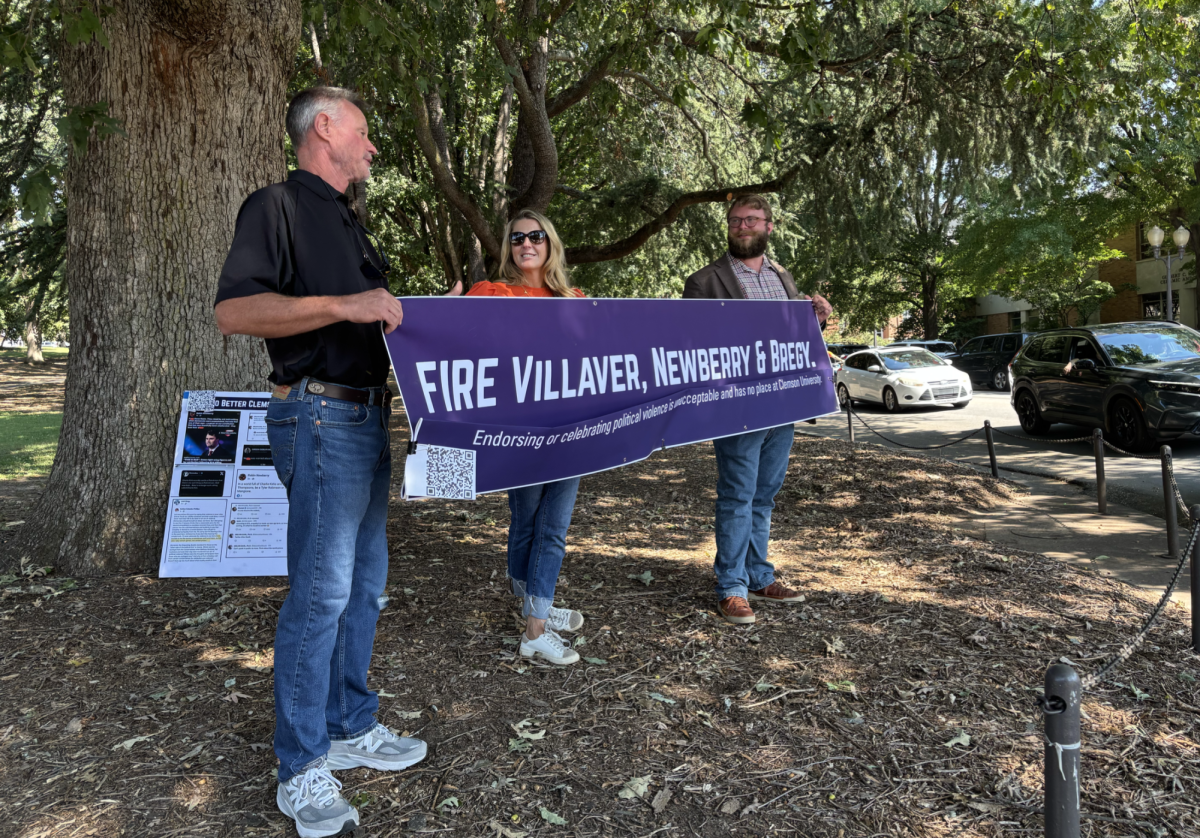On Friday, the American Civil Liberties Union of South Carolina filed a lawsuit suing Clemson University for dismissing former faculty member Joshua Bregy.
The complaint is based on violations of the First Amendment and alleges that the University fired Bregy for resharing a Facebook post about the death of conservative activist Charlie Kirk.
ACLU-SC is seeking the reinstatement of Bregy, a correction of his personnel records and monetary damages, according to a press release announcing the Bregy v. Clemson lawsuit.
The complaint was filed in the U.S. District Court for the District of South Carolina, which is the federal district court serving the entire state.
“I and my organization stand behind the University’s decision to part ways with former Assistant Professor Bregy in the wake of the comments he made through social media,” Jack Lyle, president of Clemson College Republicans, told The Tiger in an interview.
“We stand behind the Attorney General’s office in their clarification that legislation like SC 16-17-560 did not, in this case, provide protection for Mr. Bregy nor his employment,” Lyle continued, also noting that Bregy’s comments violated University standards and that CCR looks forward to seeing how the suit unfolds.
The defendants listed — whom ACLU is suing — include the Clemson University Board of Trustees, Provost Robert Jones and University President James Clements. John McCarter Jr., David Dukes and Nikki Haley, three state politicians, are referenced in the complaint but not sued.
The complaint states that Bregy, the plaintiff, was fired for “protected speech,” and that the First Amendment clearly establishes his right to speak on matters of “public importance.”
Bregy had initially reposted a Facebook post reading, “I’ll never advocate for violence in any form, but it sounds to me like karma is sometimes swift and ironic. As Kirk said, ‘play certain games, win certain prizes.’’’
The post in question also stated, “Maybe you think I’m cruel too, but I’ll say this also — I truly grieve for Kirk’s family and friends. No one deserves to go through tragic loss like that … But am I going to allow people to make a martyr out of a flawed human being whose rhetoric caused notable damage? Not a chance.”
The complaint alleges that numerous people, including South Carolina lawmakers Thomas Beach and April Cromer, threatened to defund Clemson if the University did not fire Bregy. Murrell Smith, speaker of the South Carolina House of Representatives, along with Thomas Alexander, president of the South Carolina Senate, submitted a letter urging the Board of Trustees to take “immediate and appropriate action.”
The complaint also claims that on Sept. 13, the same day that lawmakers sent the letter, Clemson University issued a statement promising a “full review” and stated that each case was being evaluated individually.
On Sept. 15, Provost Jones called Bregy to dismiss him. The next day, Jones sent Bregy his termination letter.
The complaint references Bregy’s termination letter, which stated his dismissal was effective Sept. 15 and based on his “blatantly unprofessional conduct and conduct seriously prejudicial to the University.”
“You did not show due restraint or respect, and you made no effort when you reposted to state that your views did not represent the views of Clemson University,” the plaintiff’s dismissal continued.
The complaint argues that “there is no evidence” that Bregy’s teaching, research and duties as a faculty member were unaffected by the post.
“However challenging it must have been for Clemson to confront bullying legislators or the online mob and its 280-character pitchforks, the First Amendment does not credit Clemson’s impulse to capitulate as a ‘legitimate’ interest. The Constitution requires a stronger spine than that,” the complaint continues.
The Board of Trustees’ 2023 free speech resolution statement is also referenced in the suit, which adopted principles highlighted in the “Report of the Committee on Freedom of Expression” from the University of Chicago, which “guarantees all members of the University community the broadest possible latitude to speak, write, listen, challenge, and learn.”
The report concludes that it’s not the University’s true role to protect individuals from ideas and opinions they decide are “unwelcome, disagreeable, or even deeply offensive.” It also warns that concerns regarding civility and mutual respect cannot justify closing off the discussion of ideas, regardless of whether those ideas are offensive or disagreeable to community members.
The complaint also touches on faculty and student responses.
In terms of faculty, “Bregy’s termination (not his post) sent shockwaves through the faculty … and fractured the faculty’s trust and confidence.”
As for students’ response, the lawsuit states that “students report being ‘sickened’ by the decision and ‘very sad’ about no longer having Dr. Bregy as a teacher.”
Further, the lawsuit alleges that Bregy’s dismissal “caused profound emotional, psychological, reputational, professional, and monetary harms.” It lists specific grants that he lost the opportunity to receive with his dismissal, stating that “his termination has ignited extreme anxiety” and that he is no longer receiving any salary or benefits from the University.
Additionally, the complaint states that being fired “for cause” inflicts a reputational injury on Bregy that could make it more difficult for him to become employed in the future or secure funding.
Two counts are listed as claims for relief: First Amendment speech retaliation and wrongful discharge. Under count one, the plaintiff seeks “declaratory, injunctive, and monetary relief” and his attorneys’ fees and costs under 42 U.S.C. § 1983 and 42 U.S.C. § 1988, respectively. Under count two, the plaintiff seeks “equitable and compensatory relief.”
Under South Carolina law, a fired employee has a cause of action for wrongful discharge if there is a “retaliatory discharge of the at-will employee in violation of a clear mandate of public policy.”
The complaint also mentions the case Culler v. Blue Ridge Elec. Co-op., Inc., which establishes that “it is a crime ‘against public policy’ to fire any person because of their political speech or beliefs.”
The complaint states that under Section 16-17-560 of South Carolina law, the defendants’ decision to fire Bregy was against public policy and therefore wrongful discharge.
ACLU-SC said on its Instagram that “Clemson University bowed to political pressure and fired an assistant professor over a Facebook post that was critical of Charlie Kirk.”






















